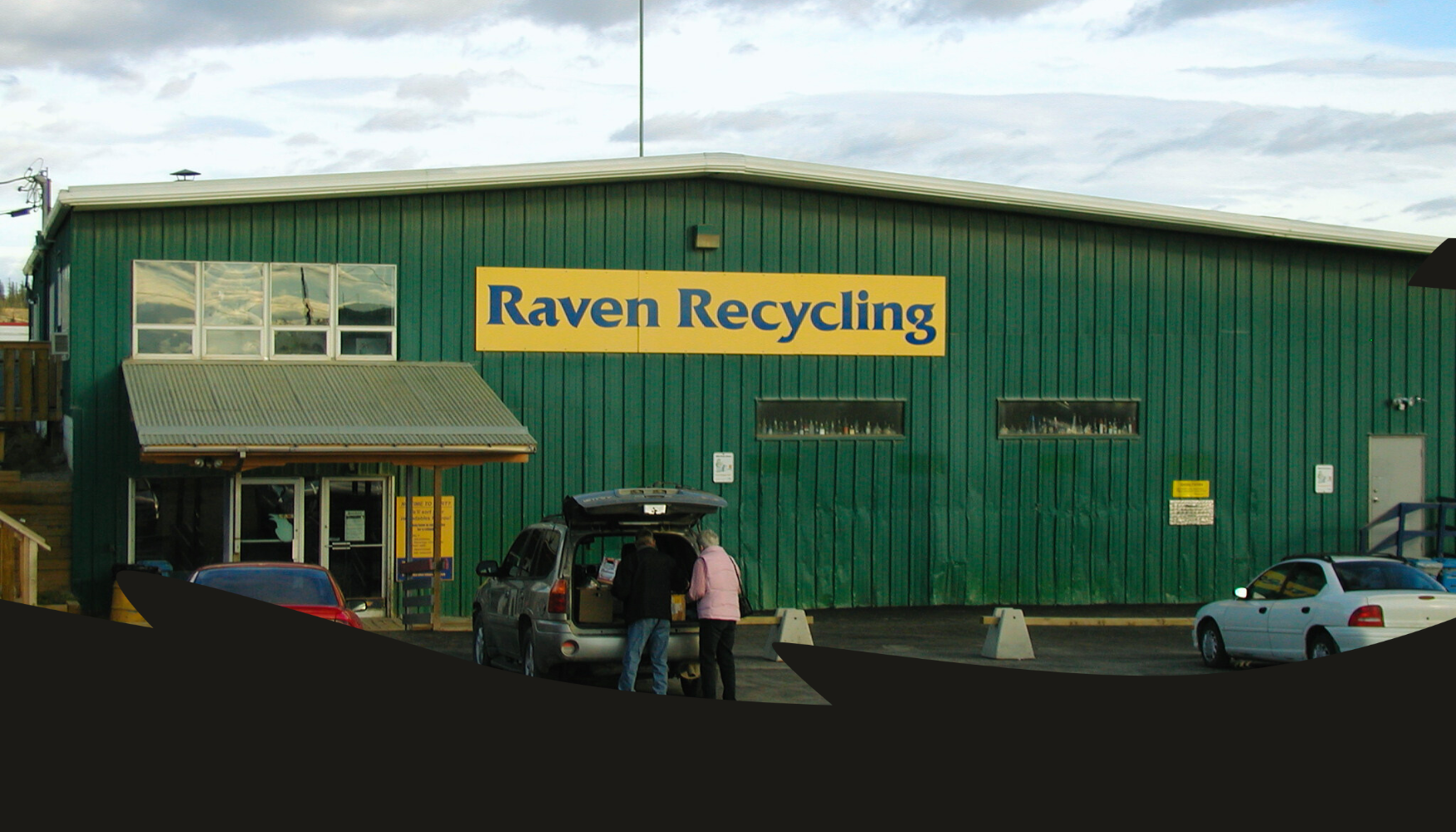
We Are
raven.
Ravens are seekers, knowledge keepers, and recyclers, smart about using available resources, the ultimate opportunists and problem solvers. They are social creatures, teachers, collaborators, and communicators, even working together with other species to find and share food. Here at Raven, we draw inspiration from our namesake about what northern resource management can look like. Through our programming, services and advocacy, we commit to the environment and continue to push for more circular systems, which respect our relationship with nature.
Acknowledging the
Land
Written for Raven by Rae Mombourquette, Tlingit Acadian citizen of the Kwanlin Dün First Nation
Raven Recycling Society is a non-government organization and social enterprise that operates and is managed on the ancestral homelands of the Tagish Kwan, and within the Traditional Territories of the Ta’an Kwäch’än Council and Kwanlin Dün First Nations in Whitehorse, Yukon. Our recycling depot resides close to the banks of Chu Nìikwän, the Southern Tutchone phrase referring to the specific stretch of the Yukon River within the Whitehorse area meaning “water, face, moonlight” (Adamson 2019). We acknowledge that the Ta’an Kwäch’än Council and the Kwanlin Dün First Nation understand their history in what is now known as Whitehorse, since time immemorial and that the two Nations have had, and continue to have, a spiritual, cultural, and economic connection to the land and resources of this area. We acknowledge that these governments and their citizens contribute significantly to the city’s social, cultural, spiritual, and economic prosperity (City of Whitehorse 2021).
Raven Recentre, further acknowledges concepts of waste management as part of a colonial paradigm and form of land occupation that has contributed to barriers that have discouraged Yukon’s First Nations from accessing traditional lands and from participating in their cultures, languages and traditional laws. Guided by the principles of the Truth and Reconciliation call to action number 92, and the United Nations Declaration on the Rights of Indigenous People, we aim towards establishing reconciliatory actions within our mandate in education, outreach and advocacy.
Adamson, Shirley (2019). Personal dialogue on Southern Tutchone placenames translated to English.
City of Whitehorse (2021). Whitehorse 2040: Official Community Plan. Retrieved from: https://www.whitehorse.ca/wp-content/uploads/2023/04/Whitehorse-2040-Official-Community-Plan-1.pdf
About
Us
Created in 1989 by a group of volunteers who wanted to see recycling happen in the Yukon, Raven now acts as a recycling and reuse hub for the entire Territory!
Raven Recentre (formerly known as Raven Recycling) is run by the Recycling Society and is a non-profit social enterprise. This means we operate much like a business, but put all profits back into achieving our goal of Zero Waste. (Check out our FAQ page for more about how recycling is paid for and more interesting tidbits!)
The Raven Recycling Society believes that the current scale of human activity is unsustainable in terms of resource use and environmental impact. The integrity of regional and global ecosystems is being threatened. We also recognize the need for a more equitable distribution of the benefits and costs of resource use. Our vision is prosperous sustainable communities within the regional and global ecosystems.
We are separate from all levels of government and do not receive core government funding. Raven is governed by a volunteer board of directors and we provide roughly 40 well-paid non-government jobs and support a network of local waste haulers and trades companies.
OUR MISSION
The Yukon community (including individuals, organizations, businesses and governments) achieves Zero Waste at a cost that justifies the financial cost as well as the social and environmental impact.
Zero Waste is a goal and philosophy that maximizes product lifespan and resource life-cycle of all materials and minimizes the negative impacts of resource use on land, air and water.
Board of Directors
Erin Neufeld - President
David Michayluk - Vice President
Liz Parker - Secretary
Alison Reid - Treasurer
Jacqueline Bedard - Director
Harry Borlase - Director
Rodney Hulstein - Director
Val Loewen - Director
Rob Florkiewicz - Director


